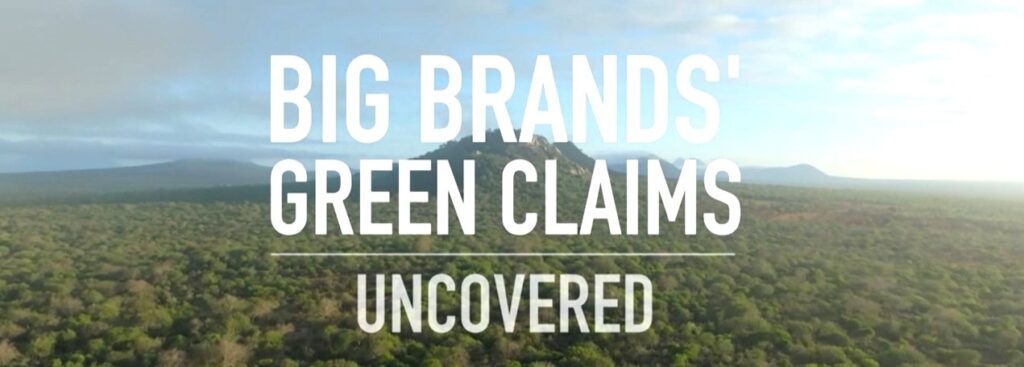 The ‘green’ claims of big brands uncovered
The ‘green’ claims of big brands uncoveredLetter from Mark Langabeer, Hastings and Rye Labour member
In July 2022, temperatures in the UK reached a record level, over 40oC, and there were numerous fires in and around the London area. In 2023, the planet reached its highest average temperatures in recorded history.
At what is known as the Paris Accords, it was agreed that carbon emissions should be net-zero by 2050. Around 170 nations signed up, to minimise man-made global warming and lessen the impact of extreme weather events. There has been pressure on many companies with big brand names to cut their carbon footprint but a recent edition of BBC Panorama, showed how they were faking it.
There are good commercial reasons for large corporations wanting to appear green, and one of the ways that they can do that is to ‘offset’ their emissions through a system known as carbon credits, which they can get by investment in the development of rain forests.

Each tonne of carbon produced, it is argued, can be off-set by protecting forests because trees are the most effective way of capturing and storing carbon. Rainforests were described as the ‘lungs of the Earth’ and no amount of tree planting can replace what is being lost.
But Panorama interviewed a climate scientist who argued that the preservation of existing forests was more effective than growing new trees. The programme investigated a company called Wildlife Works, in Kenya, in which a number of big brand names have bought credits. According to Panorama, it is questionable whether carbon credits actually contribute towards any reduction in emissions.
According to one contributor, 90% of credits are worthless. They are bought and sold like any other commodity on the market, without any regulation, and they recently plunged in value. Panorama interviewed a boss of a ‘verification company’ who claimed to be ensuring that credits are boni-fide. However, they depend on fees obtained by selling credits. Although they are not-for-profit companies, the boss had an annual salary of $420,000, plus benefits.
The programme mentioned some of the big companies that have invested in carbon credits, like Shell, British Airways, Netflix and the BBC itself. It is a supposed ‘market’ and, as in so many other instances, the market is failing.
Fossil fuels are the main cause of man-made carbon emissions and they should be left in the ground. There is an old saying that ‘you don’t control what you don’t own’ and the big polluters should be publicly owned with the aim of shifting investment towards renewables and achieving net zero within five years of a Labour Government .
The Panorama programme can still be found on BBC i-player, here.
 French farmers’ protests – Small farmers trapped by the capitalist system - By Chloé S. (Communist Party of France (PCF) – from Seine Maritime). [This article has been taken from the French socialist website La Riposte and
French farmers’ protests – Small farmers trapped by the capitalist system - By Chloé S. (Communist Party of France (PCF) – from Seine Maritime). [This article has been taken from the French socialist website La Riposte and “Kropotkin Was No Crackpot” - Review by Andy Ford, biomedical scientist The late Stephen Jay Gould is known for his large output of books on popular science, particularly in regard
“Kropotkin Was No Crackpot” - Review by Andy Ford, biomedical scientist The late Stephen Jay Gould is known for his large output of books on popular science, particularly in regard COP28: business as usual - By Michael Roberts The COP28 conference on what to do about global warming and climate change held in Dubai finished last Thursday. Attended by a
COP28: business as usual - By Michael Roberts The COP28 conference on what to do about global warming and climate change held in Dubai finished last Thursday. Attended by a Editorial: Cop28, the biggest circus in the world - The Cop26 meeting in Glasgow two years ago was described at the time by Swedish climate activist, Greta Thunberg, as just “more blah, blah blah”.
Editorial: Cop28, the biggest circus in the world - The Cop26 meeting in Glasgow two years ago was described at the time by Swedish climate activist, Greta Thunberg, as just “more blah, blah blah”. Radio review: on a feminist approach to human evolution - Review by Andy Ford The BBC Radio 4 series, The Life Scientific, gave a good summary on November 7 of the work and views of
Radio review: on a feminist approach to human evolution - Review by Andy Ford The BBC Radio 4 series, The Life Scientific, gave a good summary on November 7 of the work and views of

